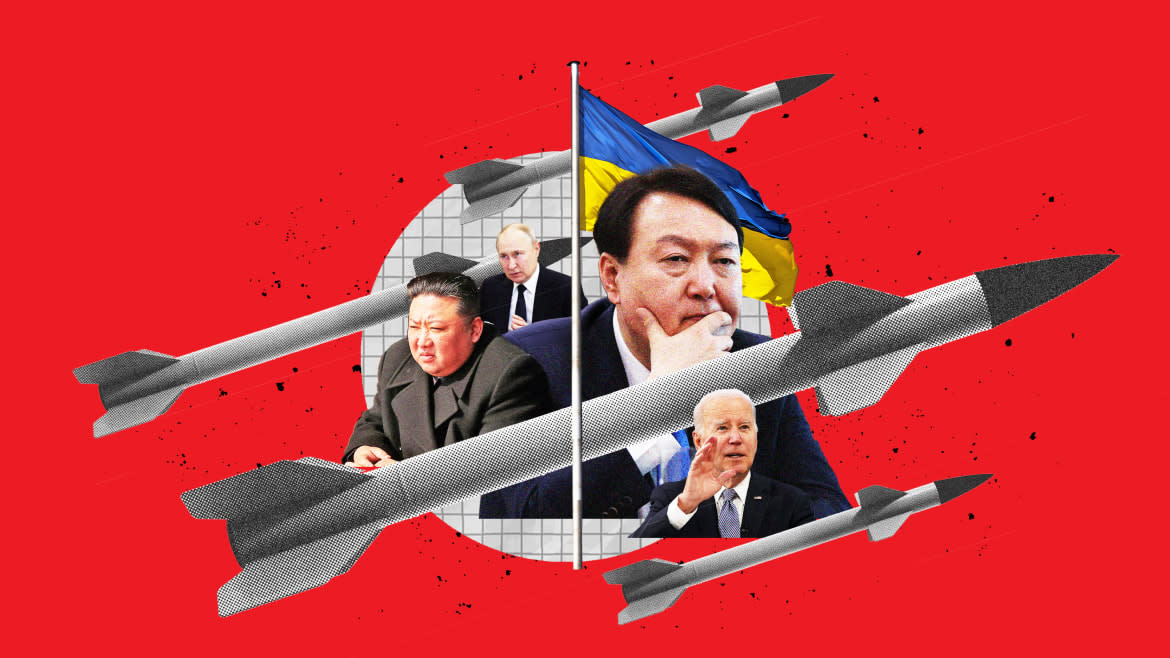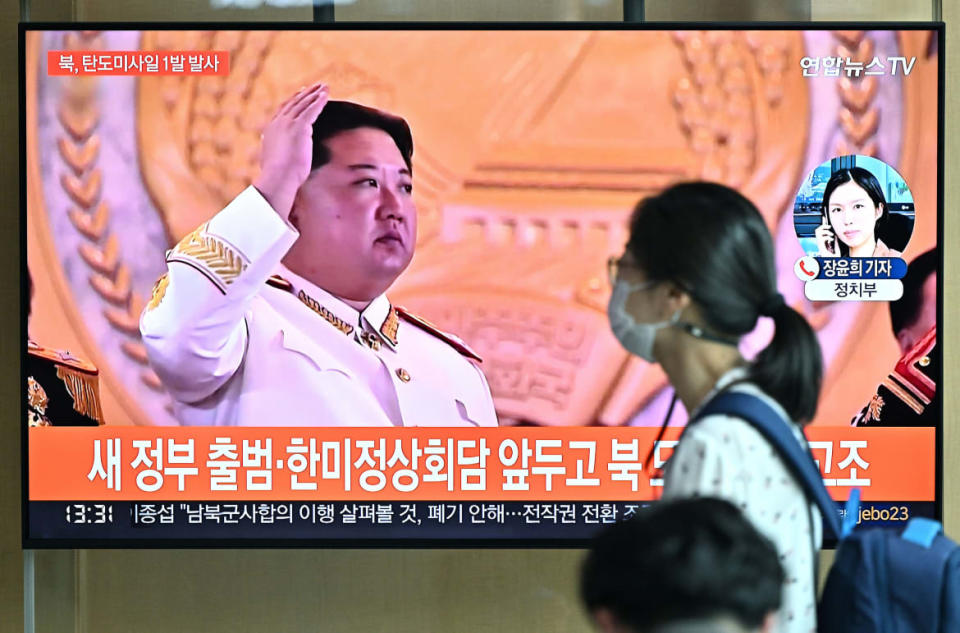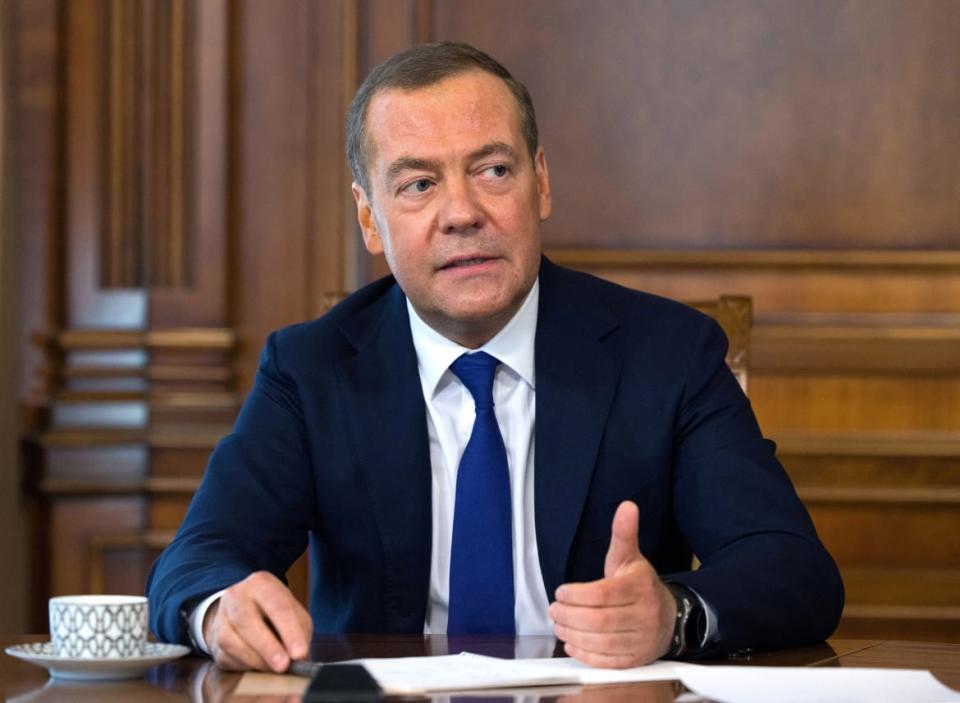Ukraine Spat Is Heating Up the Korean Nuclear Stand-Off

- Oops!Something went wrong.Please try again later.
SEOUL—Pressure over Ukraine is firing up the nuclear debate on the Korean peninsula, and South Korea’s President Yoon Suk travels to Washington, D.C. this week wondering whether to worry more about angering the Russians or deepening his relationship with President Biden.
Amid U.S. pressure on South Korea to take a more assertive position on Ukraine, Yoon sparked a firestorm of controversy by hinting at providing arms for Ukraine. South Korea might go beyond “humanitarian or financial support” for Ukraine, he told Reuters, “if there is a situation the international community cannot condone, such as any large-scale attack on civilians, massacre or serious violation of the laws of war.”
Alarmed by the response, however, South Korean officials walked back that comment, saying Yoon was only referring to a “hypothetical situation.” Earlier, they tried to shrug off the significance of leaked documents revealing that the CIA had listened in on talks in which members of South Korea’s national security council talked about what they hoped would be a secret deal for aiding Ukraine.
Under discussion was a proposal for South Korea to send artillery shells to the U.S., which could in turn ship them to Ukraine. That’s sure to be discussed, if not by Yoon, then by his new security adviser, Cho Tae-yong, who as Korea’s former ambassador to the U.S. is well plugged in and no doubt is working out a deal. Meanwhile, South Korea has already agreed to send artillery shells and bullets to Poland, replacing the ammunition Poland has sent to Ukraine.
More worrying was a comment by Dmitry Medvedev, Deputy Chairman of Russia’s Security Council, in which the former Russian president hinted at supplying arms to North Korea in retaliation. What would South Koreans say, he wondered aloud, “when they see the latest Russian weapons are in the hands of their closest neighbors—our partners from North Korea.”

A woman walks past a television screen showing a news broadcast with file footage of North Korean leader Kim Jong Un, at a railway station in Seoul.
The fact is Biden and Yoon face insurmountable differences over Ukraine and nuclear defense against North Korea ahead of their White House summit on Wednesday.
A majority of South Koreans want to go nuclear, and the United States wants South Korea to take a firm position in defiance of the Russian invasion of Ukraine. After all the happy talk is done, neither is going to get his way.
Yoon may not go so far as to suggest Biden give his blessing to South Korea fabricating its own nukes, but he may say he wants the U.S. to stockpile its own tactical nuclear warheads on bases inside the South.
“My guess is they will discuss deployment of tactical nukes to the Peninsula in wartime (possibly), and perhaps even the building of staging facilities to do so,” Bruce Bechtol, author of books and studies on North Korea’s armed forces, told The Daily Beast.
Against rising pressure inside the South to be able to go nuke for nuke against the North, Bechtol said Yoon “will also want new language added to the extended deterrence agreement” that already calls for the U.S. and South Korea to “Mobilize all capabilities, including nuclear weapons.”
The question of South Korea’s nuclear defenses has taken center stage in debate in the South while North Korea’s leader Kim Jong Un has ordered more than 200 missile tests since taking power after the death of his father Kim Jong Il nearly 12 years ago. North Korean missiles have become increasingly sophisticated, accurately finding targets in the seas off the North.
“South Korea’s ruling party shines spotlight on case for going nuclear,” headlines NK News, a website in South Korea. “Debate at parliament,” says the article, “underscores how North Korea’s nuclear development has driven Seoul to consider the once-unthinkable.”
Yoon has hinted from time to time at the need for building up the South’s nuclear defenses, whether with American or South Korean nukes, while Kim threatens to attack bases in the South with tactical nukes and refuses to enter into negotiations as long as the U.S. and South Korea stick to their demands for complete denuclearization.
“Two-thirds of South Koreans want their country to develop its own nuclear weapons, “ writes Conor Echols for the Quincy Institute, citing a survey by Seoul’s Hankook Ilbo newspaper. That “chastening finding,” he says, “comes amid years of rising tensions on the Korean peninsula.”
Most recently North Korea has test-fired an intercontinental ballistic missile using solid fuel that’s built into the missile rather than liquid fuel, which has to be loaded on the launch pad while satellites might detect it.
In a dispatch carried in English by Pyongyang’s Korean Central News Agency, North Korea’s foreign minister Choe Son Hui called it “an undeniable and stark reality” that North Korea was “a world-class nuclear power.”
Troops Reveal the ‘Biggest Problem’ That Is Helping Putin Win Right Now
In a reminder of the North’s ability to fire warheads at targets anywhere in the U.S., she said the North could guarantee security for the U.S. “only when it completely roots out its hostile policy.” The U.S., she said, had to accept that “undesirable and stark reality.”
In the face of such rhetoric, however, Biden is not expected to reverse the withdrawal by President George H.W. Bush of all nuclear warheads from South Korea in misplaced hopes North Korea could be persuaded to give up its own nuclear program.
“The U.S. wont put tac nukes back in South Korea, full stop,” Bruce Klingner, a former CIA analyst with the Heritage Foundation, told The Daily Beast. “Despite the rabid advocacy by outside experts, “ he said, South Korea “is not in any way pursuing/requesting/planning for an indigenous program.”
The most that Yoon can expect, he said, “will be something regarding extended deterrence that is more than just ‘ironclad commitment.’”—one of the standard phrases used by the U.S. side to allay South Korean concerns.” One idea, he said, might be for the U.S. and South Korea to form a “Nuclear Supplier Group” that might eventually include Japan and Australia.
Victor Cha, in charge of Korean issues at the Center for Strategic and International Studies in Washington, agreed the U.S. and South Korea were “not yet” at the point of a deal for returning U.S. nukes to South Korea but cited a report calling for “a halfway option of thinking on paper about prerequisites for returning such weapons.”
At a CSIS briefing, Cha said the Americans and South Koreans might talk about more military exercises around the Korean peninsula—“and more ways of demonstrating the presence, the reliability and the strength of the U.S. nuclear umbrella.”

Deputy head of Russia's Security Council Dmitry Medvedev.
But there would be a quid pro quo in terms of South Korean support for NATO against the Russians in Ukraine.
“Yoon gives a big gift,” said Choi Jin-wook, president of the Center for Strategic and Cultural Studies in Seoul. “He may want a big gift in return—maybe not a specific item,” While “fully supporting the U.S. global agenda.,” Choi told The Daily Beast, “he may want the U.S. to support South Korea's own agenda, its security or South Korea's competition with Japan in the U.S. empire.”
But will Washington stick to whatever assurances Biden gives Yoon?
“The U.S. nuclear commitment to South Korea is increasingly founded on promises that are unlikely to be kept in the case of a crisis,” write Jennifer Lind and Daryl Press in Foreign Affairs. “Mere reassurance is no longer enough for Seoul, and the United States and South Korea need to update their strategy for nuclear deterrence on the peninsula.”
Seoul, they write, “should work with Washington to strengthen its deterrence of Pyongyang and provide a stronger foundation for the U.S.–South Korean alliance over the long term.”
One way to make that happen would be for Yoon, in Washington, to talk more convincingly about Ukraine—even if he shrinks from intervening in the war by arming Ukrainians against Russians.
Get the Daily Beast's biggest scoops and scandals delivered right to your inbox. Sign up now.
Stay informed and gain unlimited access to the Daily Beast's unmatched reporting. Subscribe now.

